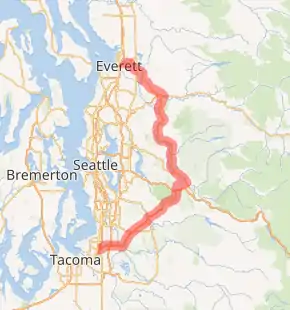Interstate 605 (Washington)
Interstate 605 (I-605) is the popular moniker given to several proposals for a new auxiliary Interstate Highway bypassing I-5 and I-405 in the U.S. state of Washington. Proposals have been heard from since the 1960s, including highways connecting from I-5 all the way to the Canada–US border, and some just between I-5 and I-90. The Washington State Department of Transportation (WSDOT) has no projects designated I-605 at this time. However, a project to convert the remainder of State Route 18 (SR 18) to a limited-access freeway has been planned by WSDOT. The highway is still restricted to one to two directional lanes (passing lanes) around Tiger Mountain near Snoqualmie.
| ||||
|---|---|---|---|---|

Proposed 1998 corridor of I-605 highlighted in red | ||||
| Route information | ||||
| Auxiliary route of I-5 | ||||
| Status | Never built | |||
| Highway system | ||||
| ||||
Proposals
Some of the first plans for a new Interstate Highway freeway, bypassing I-405, surfaced in 1965 while the highway was still under construction.[1] The first proposal was to create a new highway between I-405 and the west banks of Lake Sammamish. Residents however forced the highway to the east banks of the lake after voicing their concerns. Residents on the east side of the lake voiced similar concerns and the plan was later dropped.[2]
In 1998, the Washington State Legislature ordered a $500,000 study to investigate the benefits of extending SR 18 north to Everett through the Snoqualmie Valley.[3][4] The plan was dropped as the study found that on average only five minutes would be saved over current routes.[2] In 2002, Bellevue Square owner Kemper Freeman, Jr. made his support known for a new freeway linking Snohomish County via the Snoqualmie Valley.[5]
Another $500,000 study was ordered in 2003 by the legislature, creating a new commerce corridor to link Lewis County in the south to the Canada–US border in the north.[2] However the study showed that a highway existing north of I-90 was not economically feasible. The study proposed a toll road only for trucks, since the presence of passenger cars would discourage truck drivers from using the new alternate route. The highway was estimated to cost between $13.5 and $19 billion.[6]
Related projects
The state currently has no plans to build Interstate 605. WSDOT however is widening SR 18 between I-5 and I-90, with only the segment between the Issaquah Hobart Road and I-90 yet to be completed, creating a full limited-access freeway between I-5 and I-90, southeast of I-405.[7] While SR 18 has been a part of some I-605 proposals, it only allows drivers to bypass the Greater Seattle area on the southern and eastern sides.[8]
See also
 United States portal
United States portal U.S. Roads portal
U.S. Roads portal- List of future auxiliary Interstate Highways
- List of Interstate Highways in Washington
References
- Barr, Robert A. (December 1, 1965). "Beginning Urged Now on East Side's Traffic Problem". The Seattle Times. p. 7.
- Singer, Natalie (July 15, 2004). "State study revives idea of new Western Washington highway". The Seattle Times. The Seattle Times Company. Retrieved November 6, 2010.
- Herrinton, Gregg (April 28, 1998). "Interstate 605 Could Help Ease Traffic Mess". The Columbian. p. 1. Archived from the original on October 15, 2018. Retrieved December 14, 2013 – via HighBeam.
- Whitely, Peyton (April 24, 1998). "Is Freeway the Way? Proposed new north–south interstate on Eastside has some mountains to climb". The Seattle Times. p. B1. Retrieved December 30, 2016.
- Gilmore, Susan (August 24, 2003). "Some freeway plans never went anywhere". The Seattle Times. The Seattle Times Company. Retrieved November 6, 2010.
- "Valley will not see proposed foothills highway". Snoqualmie Valley Record. Sound Publishing Inc. October 28, 2004. Retrieved November 6, 2010.
- Mishler, Bronlea. "Project — SR 18 - Issaquah Hobart Road to I-90". Washington State Department of Transportation. Archived from the original on November 21, 2010. Retrieved November 7, 2010.
- Google (November 7, 2010). "SR 18" (Map). Google Maps. Google. Retrieved November 7, 2010.
Further reading
- Washington Commerce Corridor Feasibility Study (PDF). Bellevue, WA: Wilbur Smith Associates. December 2004.
External links
 Media related to Interstate 605 (Washington) at Wikimedia Commons
Media related to Interstate 605 (Washington) at Wikimedia Commons
